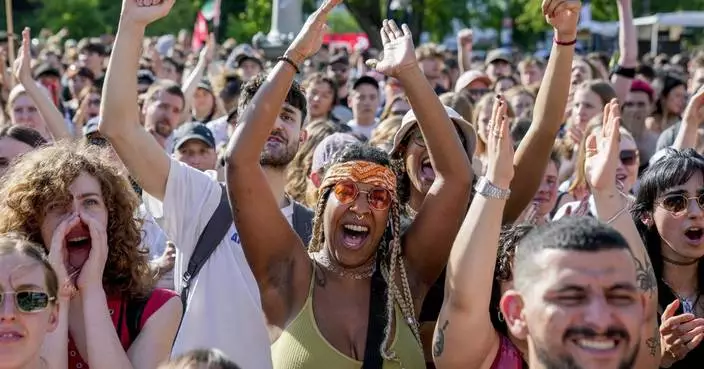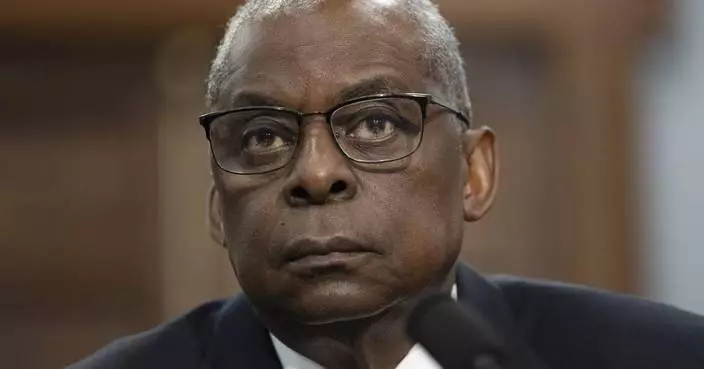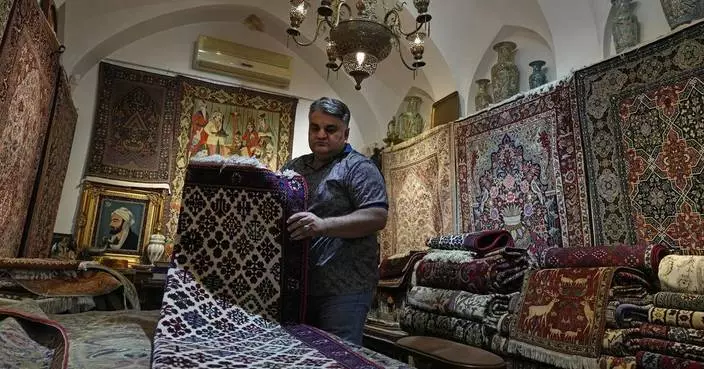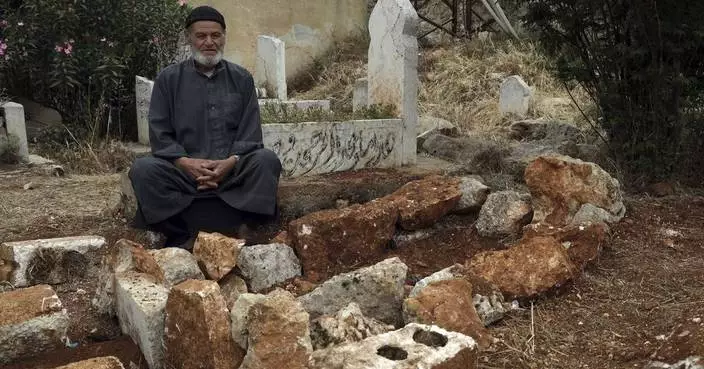Back on Brooklyn College's red brick campus this winter to launch his second bid for the White House, Bernie Sanders set aside rhetoric for a few minutes to acknowledge the neighborhood where he grew up.
The irascible Vermont senator recalled that his father had come to Brooklyn as an immigrant "without a nickel in his pocket." Arguments over money in the family's 3½-room apartment, within walking distance of the campus, taught Sanders early on what it meant to live "paycheck to paycheck."
"I know where I came from," Sanders told a crowd of supporters, contrasting his New York story with President Donald Trump's privileged upbringing in neighboring Queens, "and that is something I will never forget."
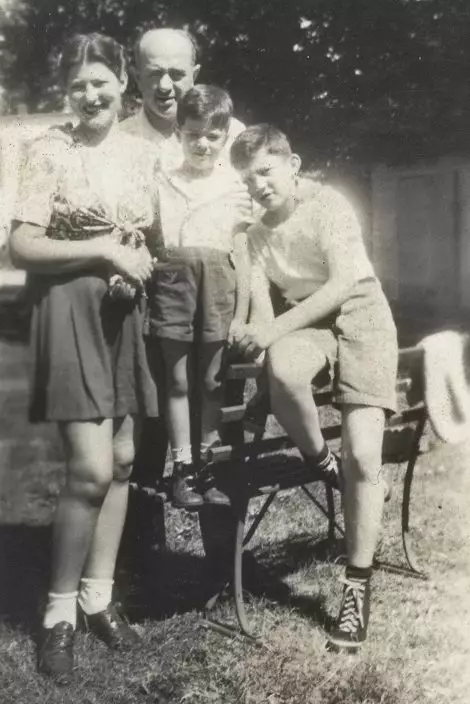
This undated photo provided by the Bernie Sanders campaign in July 2019 shows him as a child, center, with his mother, Dorothy; father, Eli; and brother, Larry. The future Vermont senator and presidential candidate recalled that his father had come to Brooklyn as an immigrant “without a nickel in his pocket.” Arguments over money in the family’s 3 12-room apartment taught Sanders early on what it meant to live “paycheck to paycheck.” (Bernie Sanders campaign via AP)
It was a noteworthy departure for a politician who, for most of his career, has avoided sharing details of his own story, rarely linking policy proposals to his personal experience. But relatives and former classmates who grew up alongside Sanders — and occasionally now Sanders himself — say there are clear connections between the candidate's Brooklyn boyhood and his decades of speeches and legislative proposals aimed at leveling the economic playing field.
Not least, they say, was the death of his mother, Dorothy, when Sanders was 18, an event he has rarely done any more than mention.
"I remember my father ... came to me and said go downstairs and say goodbye to Aunt Dorothy," recalls Sanders' cousin, Maxine Glassberg, raised in the same six-story apartment building his family lived in. "She was in bed, this was the end, and they knew she wasn't coming back."
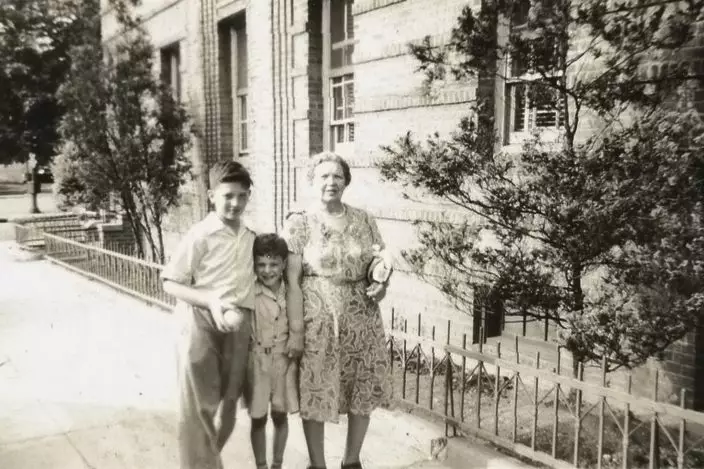
This undated photo provided by the Bernie Sanders campaign in July 2019 shows him as a child, center, and his brother, Larry, with their maternal grandmother, Bessy Glassberg, outside 1525 E. 26th St., the building where he grew up, in the Brooklyn borough of New York. The future presidential candidate, now 77, was raised in the close-knit Midwood neighborhood in the years just before and after the Korean War. The area still looks much the same as it did then, with mid-rise art deco apartment buildings, including the one Sanders grew up in, edging Kings Highway and the neatly kept houses on side streets. (Bernie Sanders campaign via AP)
The death helped shape Sanders' views on the need for equal access to health care, the senator said in a recent interview, even as it pushed him to leave Brooklyn for Vermont.
"Losing one's mother at the age of, I believe, 18 ... was very, very difficult," Sanders told The Associated Press. "In fact, I graduated Madison High School and went to Brooklyn College for one year, and I decided to leave Brooklyn because I kind of wanted to get away from the community that I'd grown up in."
The experience is one of the notable parallels between Sanders' early life and his politics.
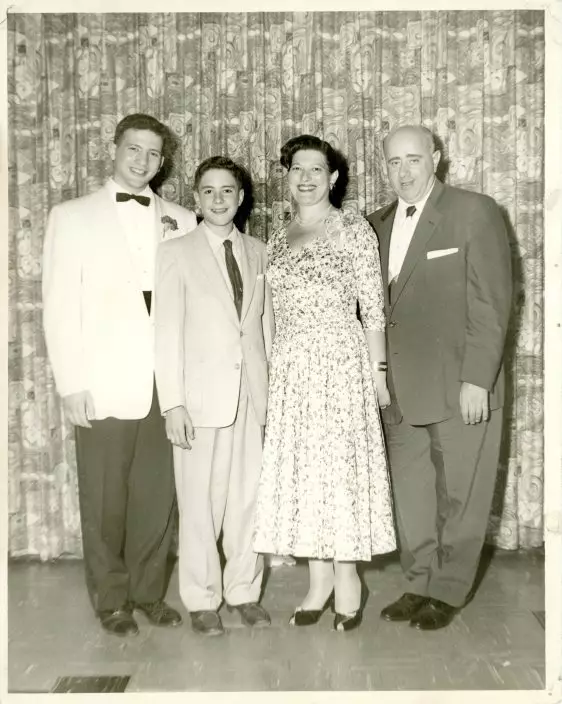
This undated photo provided by the Bernie Sanders campaign in July 2019 shows him, second from left, with his brother, Larry; mother, Dorothy; and father, Eli. A Polish immigrant who came to New York, Eli Sanders became a paint salesman and always had work. But to manage the household on his modest paychecks, Dorothy Sanders, a homemaker raised in the Bronx borough of New York, became an uncompromising scrimper and bargain hunter. The senator, who describes his family as “lower middle class,” has recalled being scolded for bringing home groceries from a nearby store, rather than one farther away with lower prices. (Bernie Sanders campaign via AP)
When he joined Congress in 1991, the first bill Sanders introduced was an unsuccessful measure to encourage states to institute universal health care. In his latest bid for the White House, the senator has hammered Walmart and other companies to stop paying "starvation wages" as he promotes an increase in the federal minimum wage.
Sanders, 77, was raised in the close-knit Midwood neighborhood in the years just before and after the Korean War. The area still looks much the same as it did then, with mid-rise art deco apartment buildings, including the one Sanders grew up in, edging Kings Highway and neatly kept houses on side streets.
It's a neighborhood of families, despite Brooklyn's current reputation as a denizen for young hipsters. Back then, its residents were mostly secular Jews, along with some families of Italian and Irish ancestry. Today, the neighborhood is home to many Orthodox Jews, with black, Hispanic and Asian households in adjacent blocks.
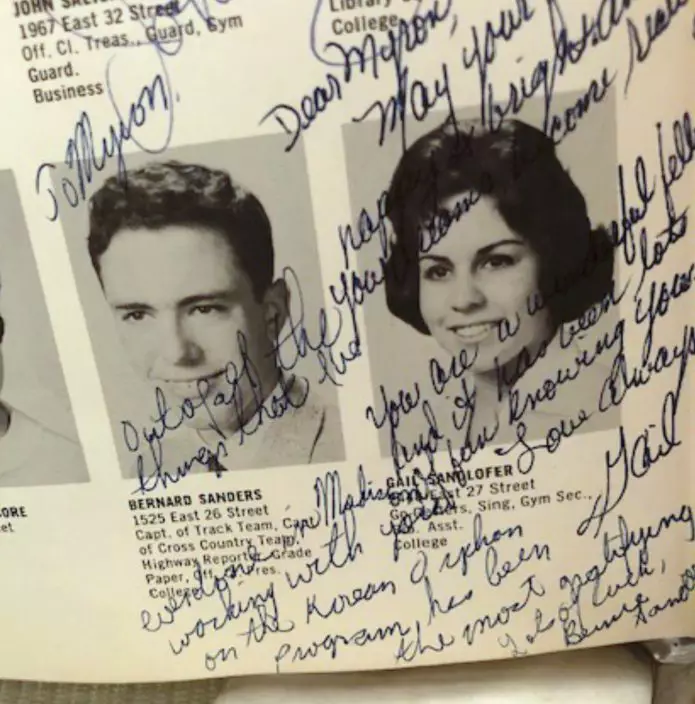
This photo provided by Myron Kalin shows an inscription written to him by Bernie Sanders, next to his photo in the 1959 yearbook for James Madison High School in the Brooklyn borough of New York. Sanders wrote that a fundraising effort for a Korean war orphan had been the "most gratifying" thing he had done in high school. Former classmates and relatives who grew up alongside the future senator _ and occasionally now Sanders himself _ say there are clear connections between the presidential candidate’s Brooklyn boyhood and his decades of speeches and legislative proposals aimed at leveling the economic playing field. (Myron Kalin via AP)
When Sanders was a boy, Midwood was defined by residents' awareness of their immigrant roots — and their ethos as middle class and striving.
"Our parents for the most part were American-born, but our grandparents weren't, and we knew what it was to struggle," says David Sillen, a neighbor and classmate who walked to school with Sanders every day for years. "The fact that our parents were more successful than their parents left us with the family construct that we should be more successful than our parents, and that was pretty pervasive."
Sillen and others recall that time fondly, with life shaped by the neighborhood's safety, good schools and middle-class solidity. But Sanders' memories are decidedly less rosy.
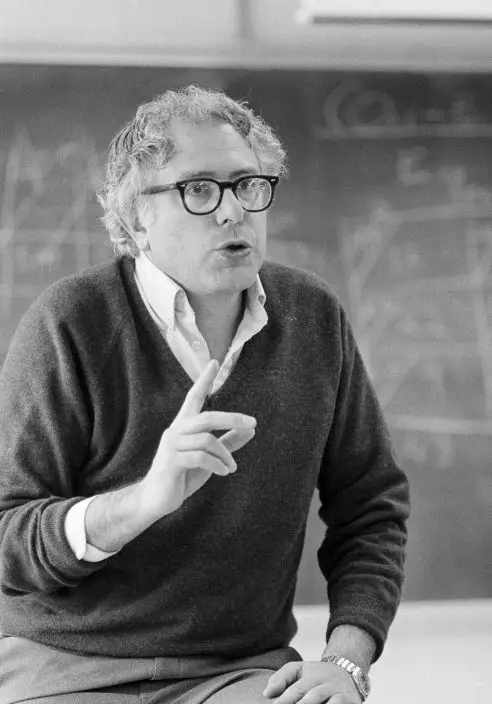
FILE - In this April 12, 1983 file photo, Bernard Sanders, mayor of Burlington, Vt., speaks to students at the University of Connecticut's West Hartford campus that his tenure as a Socialist mayor is evidence people are willing to accept radical change. (AP PhotoBob Child)
Unlike most of his classmates' parents, Sanders' father was not American-born. He came to the United States from Poland as a teenager with hardly any money or ability to speak English; many of his relatives were killed in the Holocaust. Sanders said there was little discussion of politics in his home, but his parents talked with their sons about family lost in Nazi death camps.
In New York, Eli Sanders became a paint salesman and always had work. But to manage the household on his modest paychecks, Dorothy Sanders, a homemaker, became an uncompromising scrimper and bargain hunter. The senator, who describes his family as "lower middle class," has recalled being scolded for bringing home groceries from a nearby store, rather than one farther away with lower prices. At home, his parents fought frequently about money.
"There were arguments and more arguments between our parents," Sanders wrote in "Our Revolution," published after the 2016 election. "Painful arguments. Bitter arguments. Arguments that seared through a little boy's brain, never to be forgotten."
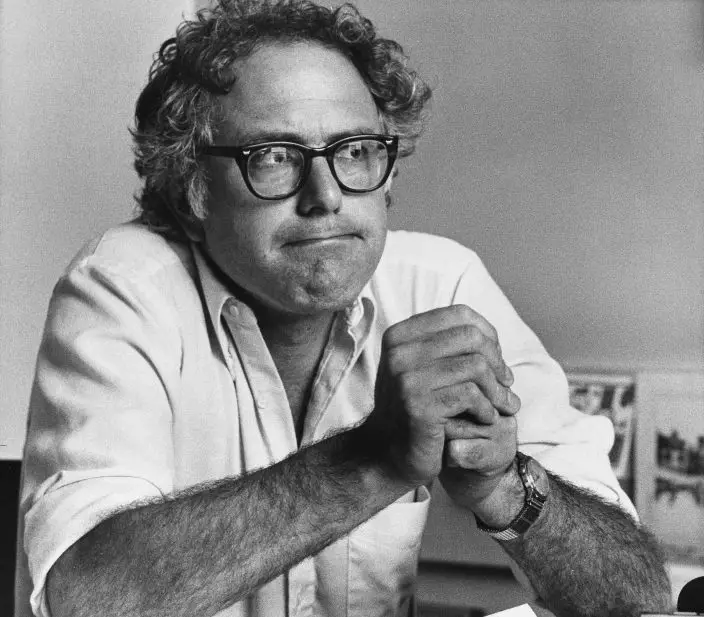
FILE - This Sept. 11, 1981 file photo shows Burlington, Vt., Mayor Bernie Sanders. Sanders says his family’s experience finding treatment for his mother, whose health worsened when he was in high school, dying when he was in college, helped shape his view that “health care is a human right _ it’s not a privilege _ and that was not the case back then and that certainly is not the case right now.” (AP PhotoDonna Light, File)
Sanders' mother, raised in a Bronx family of seven children, had long aspired to more, relatives say. Sanders was reminded of that each time he visited cousin Benjamin Glassberg, whose father's ownership of a garment business afforded a suburban house with a yard on Long Island. Back in Brooklyn, Sanders and his older brother, Larry, slept on a trundle bed in the living room.
During reciprocal visits, Glassberg recalls, Sanders' mother pushed her sons to work hard in school so they could do better. "I think she felt at times that possibly it was her fault that they didn't have a more affluent upbringing," he says.
Sanders alluded to those disappointments in his Brooklyn speech: "My mother's dream was that someday our family would move out of that rent-controlled apartment to a home of our own. That dream was never fulfilled."
Sanders' brother, who has long lived in Britain, did not respond to an interview request. But in a 2015 interview with Vermont Public Radio, Larry Sanders said that while he and his brother had what they needed, hearing their parents constantly argue over money was emotionally taxing.
"I think what Bernard and I took from that is that financial problems are never just financial problems. They enter into people's lives at very deep and personal levels," said Larry Sanders, a university lecturer who has been active in Green Party politics in his adopted country.
The Sanders brothers both attended James Madison High School, a large, academically rigorous institution that also counts New York Sen. Chuck Schumer, Supreme Court Justice Ruth Bader Ginsburg and singer Carole King as graduates.
Former classmates recall Sanders as a lanky, somewhat reserved young man best known for his talents as a distance runner.
"He was sort of a natural leader among the track team kids. They would ask, 'What does Bernie think?'" says Walter Block, a former track teammate who is now an economist.
Sanders' first foray into politics came his senior year, when he was one of three chosen to run for student body president. His platform included a promise to work with classmates to raise money for a Korean child whose parents had been killed in the war.
Sanders lost. But, as he recalls it, the winner embraced his idea, providing an early lesson in politics.
"It's that good ideas have resonance and other people will often come around to your point of view," Sanders said in an interview this month.
He went on to raise money by organizing a benefit basketball game between the Madison team and alumni. "Bernie Sanders made a campaign promise to bring back the stars, and that's exactly what he is doing," an article in a 1959 edition of the student newspaper, The Highway, reported. Signing his friend Myron Kalin's yearbook, Sanders wrote that working together to support the Korean orphan had been "the most gratifying" thing he'd done in high school.
Around that time, Dorothy Sanders' health began to worsen. Sanders increasingly missed track practice, often showing up to run just before meets, former classmates remember. "Not that he was ever outgoing," Sillen says, "but he became even more quiet."
Lou Howort, a fellow track team member, recalls that Sanders "was consumed by his family situation for that year." Sanders had aspired to go to the University of Chicago after graduation, Howort says, but "he gave that all up to stay local to be around his mother when she needed him."
Sanders instead enrolled at Brooklyn College, part of New York City's public university network.
His mother was hospitalized about two hours away, in southern New Jersey. The hospital, known today as Deborah Heart and Lung Center, started as a tuberculosis sanitorium for poor New Yorkers in the 1920s. The advent of antibiotics kept tuberculosis in check, and the institution remade itself as a specialist in heart treatment, while continuing to provide care without billing patients.
Patients were referred mostly by a network of labor organizations and fraternal groups, many of them Jewish, that supported the hospital through donations, spokeswoman Donna McArdle says. Sanders said an uncle helped his mother gain admission.
Sanders moved into a Brooklyn attic apartment with Steve Slavin, a fellow Madison graduate, who recalls the two sometimes talking until 4 in the morning. Once he and Sanders spent hours dissecting the U.S. Supreme Court's decision in Marbury v. Madison, a landmark 1803 ruling that established the power of federal courts to review laws and declare them unconstitutional.
"He was interested in these things," Slavin says. "He loved to talk about them."
Slavin says that despite nagging by their landlord to cut the noise, the apartment gave Sanders space to get away from the tensions surrounding his mother's illness. "He was sort of in denial as to how sick she actually was," he says.
Sanders moved back home the following semester. A few months later, his mother died and Sanders transferred to the University of Chicago. By the time Sanders graduated in 1964, his father had also passed away and his brother had relocated to England. Without immediate family or a home to go back to, Sanders returned briefly to New York before moving to Vermont.
A few years later, Sanders sat down with his cousin, Benjamin Glassberg, to talk about what lay ahead for them. Glassberg says he was surprised when his cousin began talking about making a longshot run on a third-party ticket for one of Vermont's seats in the U.S. Senate.
"Gee Bernie, politics? What interests you in that?" Glassberg, now 77, recalls asking. "And he would tell me about his thoughts and the fact that he was very concerned about things such as medical care and ... because his mother was ill for that period of time, I could understand where he was coming from."
Sanders says his family's experience finding treatment for his mother helped shape his view that "health care is a human right — it's not a privilege — and that was not the case back then and that certainly is not the case right now."
Given the era and the generation, it is little surprise that Sanders struck out on his own, former classmates say.
"Most of us couldn't wait to get out of Brooklyn," says Sillen, who now lives in Red Bank, New Jersey. "People didn't want to be their parents. They wanted to be different and to have their own lives."
Sillen and many of his former classmates still keep in contact. A group of men who played basketball at Madison in the 1950s meet regularly in Las Vegas. And this year more than 60 alumni from Sanders' graduating class gathered in New York for a reunion.
Sanders returned to the school in 2008 when his name was added to its Wall of Distinction, honoring particularly notable alumni. But few were surprised when the candidate sent notice that he would not be attending this time.
That's OK, former classmates say, so long as the politician who has distanced himself from Brooklyn remembers the lessons it taught.




